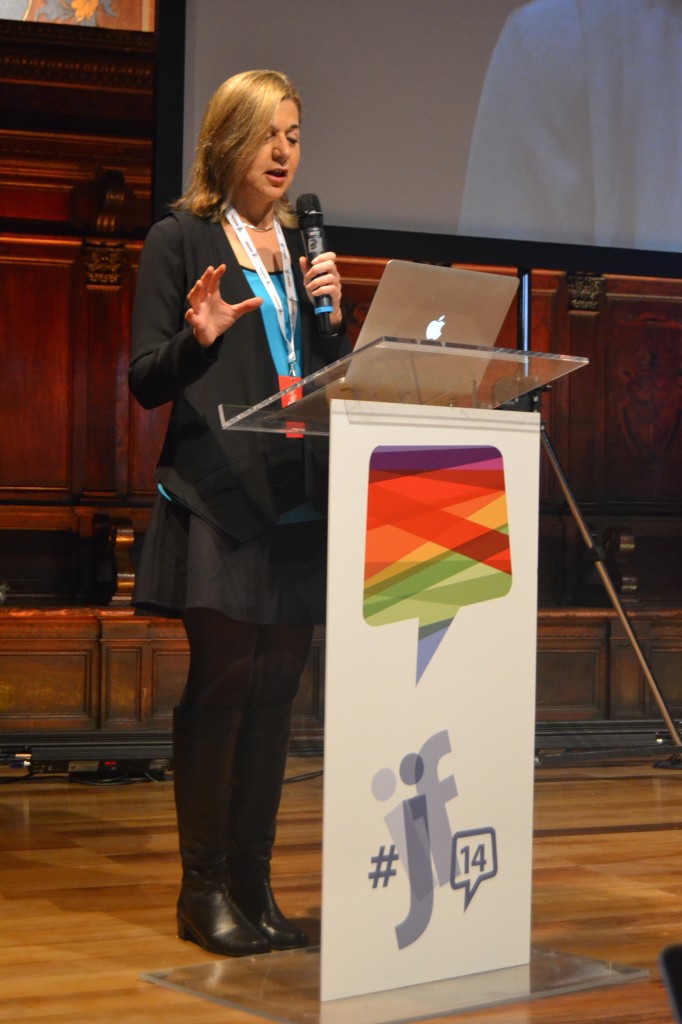
Margaret Sullivan speaks with an eager crowd at the International Journalism Festival in Perugia about the lessons she’s learned at The New York Times
There have been many successes for Margaret Sullivan. First female editor and vice president at The Buffalo News, member of the Pulitzer Prize Board in 2011, director of the American Society of News Editors (twice!)… And the first female public editor at The New York Times.
With the platforms of social media, email, and comments sections, among others, readers have gained an increased involvement in the changing form of journalism.
Sullivan is the ombudswoman. It is her task to absorb the opinions, complaints, comments and criticisms of the NYT readership, and transfer it to the editors and journalists in the newsroom – no easy task when it comes to critiquing the paper and pointing out how they possibly could have done something better.
It’s hard to please everyone, she said in front of the crowd at the Sala dei Notari, but she’s actually discovering that “it’s impossible to please anyone, ever.”
Still, she has learned to let go of whatever consequences may arise, while also acknowledging the incredible advantages that come with being the Public Editor of the world-renowned newspaper.
“I’ve had a front row seat at the changing role of journalism,” she said.
‘Islands of consensus’
Still editor at The Buffalo News, Sullivan stumbled upon a blog post by Clay Shirky, a professor at New York University, called “Newspapers and Thinking the Unthinkable.” It discussed the ongoing change in journalism and the inability to understand what is happening or what may potentially happen in the future.
It inspired her to begin her own blog, sign up for a Twitter account and put her resources into new forms of media.
“One place we’re not going is back,” she said. “We have to experiment and some things will fail.” Some, however, will succeed.
New forms of journalism have started to take shape. “Islands of consensus are starting to come to the surface,” she said.
The first thing she’s sure of: “Serious readers will pay for serious news.” She has experienced this firsthand at The New York Times, where consumer revenue surpassed advertising revenue not so long ago. People are shelling out significant money because they value the product, she explained.
“Digital news,” she went on, “is not just another platform.” Nimble new ventures – for example Vox and Vice – in Sullivan’s opinion, will survive. “We have to play to the strengths of the platforms we’re using,” she said.
A huge trend arising is data-driven journalism. “We have not yet figured out what it’s going to be,” she said. Despite that, she expressed her confidence that it will be a major force as journalism continues to evolve. Not a word-loving journalist’s strong suit, she admitted, but something that will need to be embraced.
She’s also not opposed to media organizations that receive funding from philanthropists, and cited Propublica as an example. “It’s a great use of some enormous personal wealth,” she said.
Romantic notions left behind
The smell of ink on a freshly-printed newspaper or the “roar of the presses” are two notions Sullivan said she’s had to loosen up on. There are, however, four things she’s sure should never alter and always remain the foundation of a true journalistic institution.
Number one: integrity.
“As a journalist, you’re not for sale,” she told the crowd. Not for a free lunch, inside access, or a way into a great book deal. Truth seeking and telling, according to her, should remain at the forefront of any journalist’s mind. “Your work is your work,” she said. “Always give credit where credit is due, and do it unfailingly.”
Challenge the powerful. The government has an increasing desire to shoot the messenger, particularly in the United States, Sullivan said. Watchdog news and whistleblowers are irreplaceable, but unfortunately they are declining due to the the disappearance of local newsrooms. This is the “biggest reason local newspapers need to figure out their balance sheets…fast,” she said. Sullivan believes watchdog practices and accountability are the most important forms of journalism.
Always get it right. “Fast is good,” she said, “but right is better.”
Today, the notion of breaking news and being the first to break that news is, for many, a priority. Instead, she said, we should practice the “strongest possible commitment to accuracy and…fairness.”
“For many of the different ethical challenges,” she went on, “transparency is often the answer.” It’s the fourth certainty for Sullivan. As with most aspects of life, being clear and honest about mistakes and uncertainties is one of the most important things a journalist can do. “We’re not always so eager to shine [the] light on ourselves,” she said. Doing so, however, can prevent backlash, and even instigate a meaningful conversation.
Journalists and sharks
Though we live in an ever-changing time for journalism, being steadfast to your original intentions as a journalist will enable success no matter what comes next.
Sullivan knew since she was a teenager as editor of her high school paper that she was meant to do this job. “That makes us the lucky ones,” she said, referring to those individuals who have known their calling from a young age and succeeded in following it.
For her, remaining true to the core values that attracted her to journalism means being adaptable, entrepreneurial, determined and driven.
Journalists have a “deep sense of compassion for the underdogs,” she said, “and a desire to make the world a better place by shining a light on what is wrong.”
“These days, being a journalists shares one quality with a shark,” she said. “If you’re not moving forward, it’s over.”